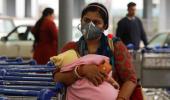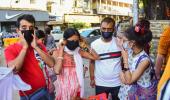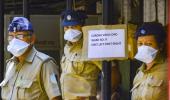According to the scientists, people infected with SARS-CoV-2 might be spreading the virus without recognizing, or prior to recognizing, symptoms.

The novel coronavirus, responsible for the COVID-19 pandemic, can be stable for several hours to days in aerosols and on surfaces, according to a new study which suggests that even people who do not yet show symptoms of the disease can spread the infection to others.
The research, published in the New England Journal of Medicine, described the stability of the novel coronavirus, SARS-CoV-2, noting that people may acquire the virus through the air, and after touching contaminated objects.
Researchers, including those from the University of California, Los Angeles in the United States, said SARS-CoV-2 was detectable in aerosols for up to three hours.
They said the virus can also remain stable for about four hours on copper, up to 24 hours on cardboard, and for two to three days on plastic and stainless steel.
In the research, the scientists compared how the environment affects SARS-CoV-2 and SARS-CoV-1, which caused the 2002-2003 SARS epidemic .
They said SARS-CoV-1, which was eradicated by intensive contact tracing and case isolation measures, is the human coronavirus most closely related to SARS-CoV-2.
The current study noted that the two viruses behaved similarly, which according to the scientists, fails to explain why COVID-19 has become a much larger outbreak.
The researchers attempted to mimic virus being deposited from an infected person onto everyday surfaces in a household or hospital setting, such as through coughing or touching objects.
They then assessed how long the virus remained infectious on these surfaces.
According to the scientists, people infected with SARS-CoV-2 might be spreading the virus without recognizing, or prior to recognizing, symptoms.
This would make disease control measures that were effective against SARS-CoV-1 less effective against its successor, they said.
In contrast to SARS-CoV-1, the study noted that most secondary cases of virus transmission of SARS-CoV-2 appear to be occurring in community settings rather than healthcare settings.
However, healthcare settings are also vulnerable to the introduction and spread of SARS-CoV-2, and the stability of SARS-CoV-2 in aerosols and on surfaces likely contributes to transmission of the virus in healthcare settings, the researchers said.
Based on the findings, they suggested that public health professionals use precautions similar to those for influenza and other respiratory viruses to prevent the spread of SARS-CoV-2.











 © 2025
© 2025